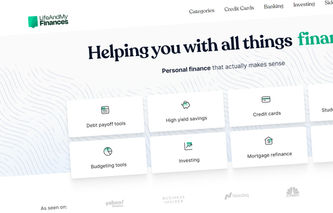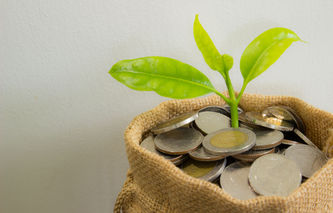You’re here to learn how to aggressively pay off credit card debt. Perhaps you’re in a rush—or worried the motivation that kicked in won’t stay with you forever.
So, let’s get to it—
This article will show you:
How to aggressively pay off your credit card debt.
The best ways to pay off your credit cards fast.
How to decide how aggressively you want to pay them off.
Read more:
You know how you got yourself into this, so I’ll spare you the definitions of too much debt and calculating your debt-to-income ratio. (But if you want to read up on getting out of debt, be our guest).
Instead, let’s focus on the best and fastest ways to pay off your credit card debt.
How to Pay Off Credit Cards Debt Fast
Paying off your credit cards is pretty straightforward if you think about it.
All it really takes is—
Spending less money.
Not using your credit cards.
Staying on track with paying the debts off.
The secret sauce? Motivation. Accountability. Discipline. Rewards. (Or your pants on fire at the mere thought of debt collectors lurking in.)
Below, you’ll find some great ways to get rid of all your stubborn debt, but—
The real game changer will be the joy and pride you’ll feel once the first credit card is paid off in full.
That’s why we recommend you use the debt snowball method. The faster you see the results, the easier it’ll be to keep the momentum going. But first—
1. Decide how aggressively you want to pay off your debt
How aggressive do you actually want to be while paying it down? There are a few things to consider—
Are there any prepayment penalties on your card(s)? If so, what are they, and is getting out of debt fast worth paying them?
Are any of your credit cards close to reaching the credit limit? If the answer is yes, it would be best to pay it off first.
How much will you actually save on interest by paying off debt fast? Use our payoff calculator to crunch the numbers. You’ll find the free debt calculator template here.
Did you take care of more pressing financial obligations? If you have a doctor’s appointment due, maybe it would be smarter to take care of that first.
2. Choose Debt Snowball method
The debt snowball method is about wiping out your smallest debts first.
By paying them off quickly, you’ll feel like a debt-busting superhero, making it easier to stay pumped and keep going.
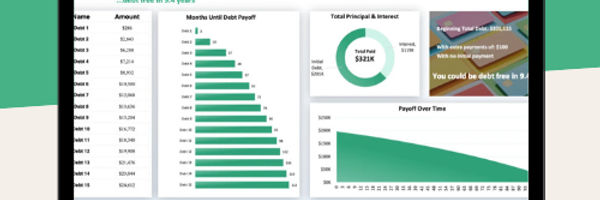
Lay out your credit card debt with the minimum payments and interest to see how long it will take to pay off!
What you will get:
Interactive dashboard
Customizable to your needs
Stay on track with charts and graphs
Suitable for up to 16 or 32 debts!

To learn how the method works in practice (with real-life examples) check out these articles:
Want the TLDR version? Watch this video:
Now that you know where to start paying off the debts, learn how to find the money—
3. Budget like a boss
To aggressively pay off your credit card debt, you’ve got to start with a solid plan.
Tracking your spending helps you see where your money’s going and find small pockets to save.
Once you’ve got a handle on your expenses, figure out where to cut back and use that extra cash to tackle your debt.
Creating a budget might feel like a chore, but it’s crucial to organize your finances.
With your budget in place, you’ll have a clear roadmap, making it easier to stay on track and crush your credit card debt faster than ever.
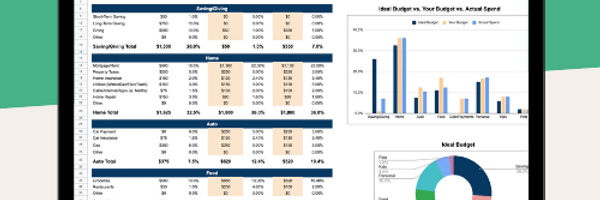
Simple, quick, and easy monthly budget template for Google Sheets and Excel.
With this template, you will get:
Pre-set expense categories
Simplified dashboard and day-by-day monthly tracker
Automated charts for comparison
Day-by-day views for budgets and actual spend

To make things easy for you, we prepared a few handy budgeting tools:
4. Slash your expenses
If you’re serious about paying off your credit card debt, it’s time to play detective and hunt down non-essential spending.
Take a close look at your budget and see if there are any areas where you can cut back.
Maybe it’s eating out less, canceling subscriptions, or finding cheaper alternatives to the fancy glass of wine you have every Saturday night.
Trimming the fat from your budget will free up more money to throw at your debt. It might take some creativity and a bit (or a lot) of sacrifice—but it’ll be worth it when you’re finally debt-free.
5. Boost your income
Want to turbo-charge your debt repayment? Look for ways to make some extra cash.
Side gigs and freelancing can be a goldmine, giving you the flexibility to work around your schedule—and every extra penny you make can go towards paying off your credit card debt.
Check out our best side gigs ideas:
If you really want to aggressively pay off your credit card debt—it’s time to hustle like never before.
Another option is to sell stuff you don’t need anymore.
Clear out the clutter and pocket cash by selling unwanted things online or at a garage sale. It’s a win-win: you’ll free up space and get closer to being debt-free.
You have the money. Now you may ask: What are the smartest ways to pay off credit card debt?
6. Negotiate your way to lower rates
Did you know you can try to talk your credit card company into giving you a lower interest rate?
A quick chat could save you some serious cash in the long run—and all it takes is a little bit of courage and some smooth talking.
Get in touch with your credit card company, explain your situation, and see if they’re willing to cut you some slack. The worst they can say is no. But if they say yes, you’ll be one step closer to breaking free from credit card debt.
7. Avoid new debt
It’s pretty self-explanatory. Unless you really have to, don’t create new debt.
Solomon Lyle, the Principal Attorney at Oak View Law Group, echoes this advice,
While aggressively paying off credit card debt, it’s crucial to avoid accumulating additional debt. Cut up or hide credit cards, resist the urge to make new purchases, and practice responsible spending habits.Solomon Lyle, Principal Attorney at Oak View Law Group
8. Put windfalls to work
Got a surprise bonus or a tax refund? Instead of splurging on something fancy, use that extra cash to chip away at your credit card debt.
It might be tempting to treat yourself, but putting windfalls toward your debt can make a huge difference in how fast you become debt-free.
9. Get a debt-busting buddy
Getting out of debt can be challenging and sometimes even lonely. Having a debt-busting buddy can make all the difference in the world.
They can hold you accountable for your financial decisions, help you stay on track with your debt repayment plan, provide emotional support and encouragement when the going gets tough, and share experiences to help you make better financial choices.
Remember to celebrate your financial wins, no matter how small or insignificant they sometimes feel.
10. Set and forget debt payments
Want to make paying off your credit card debt a no-brainer? Automate your payments.
By setting up automatic transfers, you’ll avoid late or missed payments, which can hurt your credit score and rack up fees.
Going on autopilot with your payments also helps you stay on track with your debt repayment plan—you won’t have to stress about remembering due dates or making manual transfers.

Lay out your credit card debt with the minimum payments and interest to see how long it will take to pay off!
What you will get:
Interactive dashboard
Customizable to your needs
Stay on track with charts and graphs
Suitable for up to 16 or 32 debts!

11. Keep tabs on your progress
Keeping an eye on your progress is essential when aggressively paying off debt.
Checking your debt balances often helps you stay focused and gives you that extra push to keep going until you’re debt-free.
12. Debt Avalanche method
The Debt Avalanche method is a smart way to tackle your debt by going after the high-interest ones first.
This way, you save some cash over time. The bad part? You won’t see any major results for a while.
That’s why financial experts—including Derek Sall and Dave Ramsey—don’t recommend this strategy. It would take some time to see real results, which can be demotivating.
If you’re still curious about it, here’s how it works:
List your debts, starting with the highest interest rate, and work your way down.
Pay the minimum on all debts, but throw any extra money at the one with the highest interest.
Once that’s paid off, move on to the next highest, and so on.
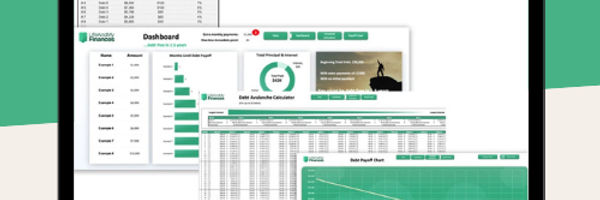
Want to get out of debt this year? This avalanche debt payoff spreadsheet is what you need!
A few top features of this template:
Fully customizable and easy to “play around” with
This tool is awesome for motivation!
Room for up to 32 debts!

13. Balance transfer cards
When discussing how to aggressively pay off credit card debt, we have to mention the balance transfer credit cards.
They can be a game-changer when you’re trying to pay off credit cards,or they can put you in an even worse situation.
These cards let you move your existing debt onto a new card, usually with a lower interest rate or even a 0% introductory rate for a certain period.
If you can stay on track and pay the cards off in the intro period—perfect. But if you don’t make a payment—or you run out of time—you’re in trouble.
If you consider using them, read the fine print (carefully), watch out for fees, and have a plan to pay off the transferred balance before the promotional rate expires.
And, of course, don’t forget to keep your spending in check so you don’t end up in more debt.
14. Debt consolidation loan
A debt consolidation loan is another option to consider when handling your debt. It involves taking out a new loan to pay off multiple debts, like credit cards or personal loans.
The idea is to simplify your payments and score a lower interest rate, making managing and paying off your debt easier.
Just be sure to shop around for the best loan terms and rates, and keep in mind that you’ll need a solid credit score to qualify for the better options.
Once you’ve consolidated your debt, focus on sticking to your repayment plan and avoid racking up new debt along the way.
(Want to get out of debt faster? Check out our new Get Out of Debt course.)
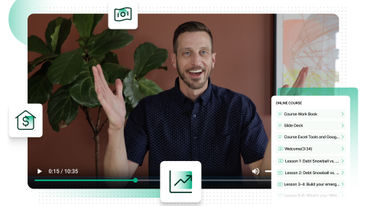
The Pros and Cons of Aggressively Paying Off Your Credit Card Debt
Let’s take a step back and see what’s awesome and what’s not that great about aggressively paying debt off.
Pros
Save on interest
Paying off debt fast means you’ll fork out less cash for interest in the long run.
Boost your credit score
Knocking down your debt can improve your credit utilization ratio, which helps pump up your credit score.
Chill out more
Being debt-free can take a load off your mind, making you feel less stressed and happier overall.
Enjoy financial freedom
With less debt, you’ll have extra money to save, invest, or spend on the fun stuff in life.
Reach goals faster
Aggressive debt repayment can speed up achieving financial goals, like snagging a new home or launching a business.
Easier money management
Wiping out debt makes handling your finances a breeze, as you’ll have fewer payments to juggle.
Better money habits
Zeroing in on debt repayment helps you build solid money management skills that’ll pay off in the long run.
High-five yourself
There’s an awesome sense of achievement when you become debt-free, knowing you’ve crushed your financial hurdles.
Read more:
Cons
Less money for fun and leisure
When you’re focused on paying off debt fast, you might not have as much cash for fun stuff or everyday spending.
Cutting back
You might have to give up some things you enjoy, like eating out or going on vacation, to free up more money for debt repayment.
Emergency fund risk
If you’re throwing all your extra cash at debt, you might not have enough set aside for emergencies, which could put you in a tough spot if unexpected expenses pop up.
Missed investment opportunities
While paying off debt is important, you could miss out on opportunities to invest and grow your wealth if you’re putting all your money towards debt.
Burnout
Going all-in on debt repayment can be mentally draining, and it’s possible to feel overwhelmed or burned out if you’re constantly pushing yourself to the limit.
Strained relationships
Your aggressive debt repayment plan might affect your relationships if it causes tension or disagreements about money management with your partner or family members.
So, after reading these—what does your gut tell you? Take your time and weigh up the options before you decide which route you want to take when it comes to paying off your debts.
Tools and Resources to Pay Off Your Credit Cards Fast
To make things easier for you, we prepared a list of tools and resources that will help you get out of debt fast:
The How To Get Out Of Debt Fast course will teach you how to choose the right debt payoff method for you, discover your why, make more money, and more.
Free budget calculator will help you track and change your spending habits.
Using the Debt Snowball vs. Avalanche calculator lets you decide which method is better for your situation.
The debt snowball spreadsheet in Excel is an easy way to stay motivated along the debt payoff journey.
A free debt avalanche Excel spreadsheet will let you create a visual representation of your debt and calculate how much you should pay.
A credit card payoff calculator excel spreadsheet will help you map out all the payments for up to sixteen credit cards.

Lay out your credit card debt with the minimum payments and interest to see how long it will take to pay off!
What you will get:
Interactive dashboard
Customizable to your needs
Stay on track with charts and graphs
Suitable for up to 16 or 32 debts!

Key Takeaways
Key Takeaways
Stop using your credit cards.
Create a budget and a payoff plan.
Start making more money.
Put every spare dollar toward your credit card debt.
FAQ
How do you pay off $5,000 of credit card debt?
How do you pay off $40,000 in debt fast?
How do you pay off thousands in credit card debt?
How many people have $50,000 in credit card debt?
How many people have over $10,000 in credit card debt?
How much credit card debt is considered a lot?
What are the three main strategies for paying down debt?
Sources
GOBankingRates. (n.d.). Jaw-Dropping Stats About the State of Debt in America | GOBankingRates. Retrieved May 22, 2023, from https://www.gobankingrates.com/credit-cards/advice/jaw-dropping-stats-about-state-of-credit-card-debt-in-america/






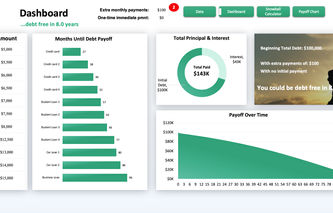
.jpg)
